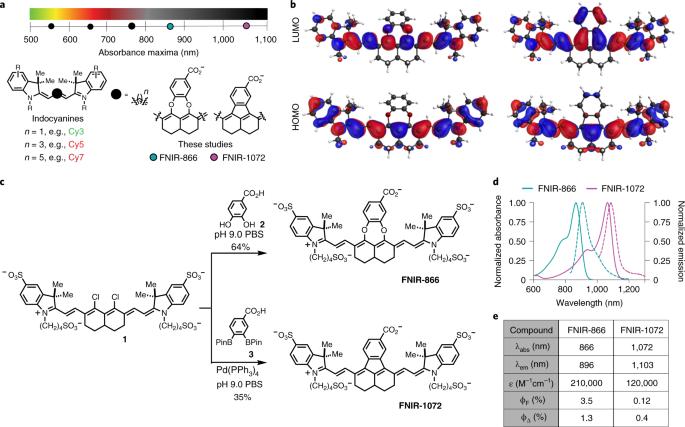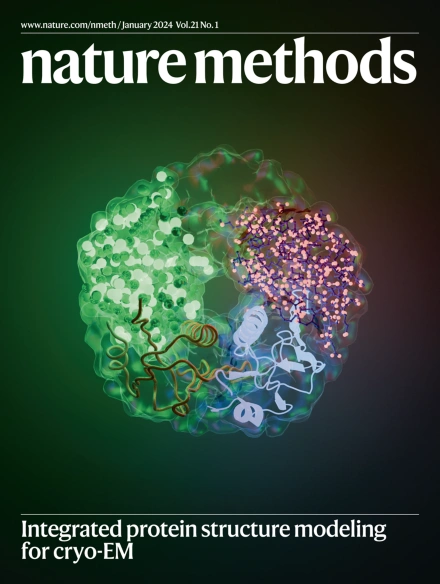Targeted multicolor in vivo imaging over 1,000 nm enabled by nonamethine cyanines
IF 32.1
1区 生物学
Q1 BIOCHEMICAL RESEARCH METHODS
引用次数: 40
Abstract
Recent progress has shown that using wavelengths between 1,000 and 2,000 nm, referred to as the shortwave-infrared or near-infrared (NIR)-II range, can enable high-resolution in vivo imaging at depths not possible with conventional optical wavelengths. However, few bioconjugatable probes of the type that have proven invaluable for multiplexed imaging in the visible and NIR range are available for imaging these wavelengths. Using rational design, we have generated persulfonated indocyanine dyes with absorbance maxima at 872 and 1,072 nm through catechol-ring and aryl-ring fusion, respectively, onto the nonamethine scaffold. Multiplexed two-color and three-color in vivo imaging using monoclonal antibody and dextran conjugates in several tumor models illustrate the benefits of concurrent labeling of the tumor and healthy surrounding tissue and lymphatics. These efforts are enabled by complementary advances in a custom-built NIR/shortwave-infrared imaging setup and software package for multicolor real-time imaging. Rational design was used to develop a suite of red-shifted, bioconjugatable heptamethine cyanine dyes for multiplexed in vivo imaging in the shortwave-infrared/near-infrared-II region.

在1000纳米以上的目标多色体内成像是由非花青素实现的
最新进展表明,使用波长在 1,000 纳米到 2,000 纳米之间的波长,即短波-红外或近红外(NIR)-II 波段,可以在传统光学波长无法实现的深度进行高分辨率活体成像。然而,在可见光和近红外波段的多路复用成像中,很少有可生物结合的探针可用于这些波段的成像。通过合理的设计,我们将儿茶酚环和芳香环融合到壬胺基支架上,生成了过磺化吲哚菁染料,其最大吸收波长分别为 872 纳米和 1072 纳米。在几种肿瘤模型中使用单克隆抗体和葡聚糖共轭物进行复用双色和三色体内成像,说明了同时标记肿瘤和周围健康组织及淋巴管的好处。这些工作得益于定制的近红外/短波-红外成像装置和多色实时成像软件包的互补性进展。合理的设计被用来开发一套红移、可生物共轭的庚氨氰染料,用于短波-红外/近红外-II 区的多重活体成像。
本文章由计算机程序翻译,如有差异,请以英文原文为准。
求助全文
约1分钟内获得全文
求助全文
来源期刊

Nature Methods
生物-生化研究方法
CiteScore
58.70
自引率
1.70%
发文量
326
审稿时长
1 months
期刊介绍:
Nature Methods is a monthly journal that focuses on publishing innovative methods and substantial enhancements to fundamental life sciences research techniques. Geared towards a diverse, interdisciplinary readership of researchers in academia and industry engaged in laboratory work, the journal offers new tools for research and emphasizes the immediate practical significance of the featured work. It publishes primary research papers and reviews recent technical and methodological advancements, with a particular interest in primary methods papers relevant to the biological and biomedical sciences. This includes methods rooted in chemistry with practical applications for studying biological problems.
 求助内容:
求助内容: 应助结果提醒方式:
应助结果提醒方式:


